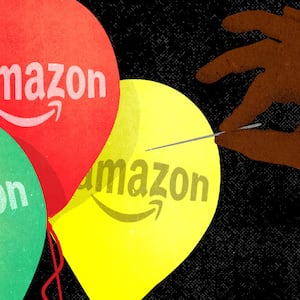The Amazon employee who died at a New Jersey fulfillment center during the Prime Day sales rush was a hard-working dad from the Dominican Republic who “was everything to this family,” one relative confirmed to The Daily Beast.
Rafael Reynaldo Mota Frias, 42, had a fatal heart attack during his July 13 shift at Amazon’s Carteret warehouse known as EWR9. In tributes on Facebook, several family members noted that Mota Frias, who is from La Romana, died of cardiac arrest.
“You will never be forgotten,” a niece wrote in a post. “We will always remember you as the selfless man that you were. Always worrying about people’s health and stability. He was hardworking, funny and affectionate.”
While Mota Frias’ family grieves, coworkers told The Daily Beast they suspect working conditions within the warehouse might have contributed to his medical emergency.
A cousin of Mota Frias told The Daily Beast she felt similarly.
“He was accomplished at his job but it was too demanding,” said Marlen Frias in Spanish.
Marlen declined a formal interview, but said her cousin was a family man and “great person” who “always thought about everyone else.”
Last week, amid reports that an unidentified Amazon worker died at the facility, it was revealed that federal investigators with the Department of Labor’s Occupational Safety and Health Administration (OSHA) were investigating what happened to him.
The Carteret warehouse isn’t the only one facing scrutiny. OSHA and New York federal prosecutors also said last week that they were inspecting Amazon warehouses in New York, Illinois, and Florida for safety issues. According to CNBC, the Civil Division of the U.S. Attorney’s Office in Manhattan was probing possible workplace hazards and whether Amazon was hiding injuries from OSHA and other agencies.
Employees of Amazon’s Carteret facility told The Daily Beast that they believe that Mota Frias was overworked and overheated when he went into cardiac arrest, and that they fear the fast-paced environment inside the warehouse, which lacks air conditioning in the main work area, is putting employees’ health in danger. (Data from AccuWeather shows a high of 92 degrees in Carteret that day and a low of 74 degrees.)

But Amazon spokesperson Sam Stephenson said suggestions that Mota Frias’ job led to his death are merely “rumors” and “false.”
“We’re deeply saddened by the passing of our colleague and offer our condolences to his family and friends,” Stephenson said in a statement. “There have been rumors suggesting that his passing was work-related—those statements are false. Our internal investigation has shown that this was not a work-related incident, and instead was related to a personal medical condition. OSHA is currently investigating the incident, and, based upon the evidence currently available to us, we fully expect that it will reach the same conclusion.”
Stephenson said that Amazon conducted an internal investigation which revealed that a colleague said Mota Frias had reported experiencing chest pains the evening before his shift but didn’t notify his coworkers or managers of his symptoms.
One colleague told The Daily Beast that Mota Frias and other workers pleaded for fans to be placed in their work area hours before he died. “It’s crazy because I was right there. I feel like Amazon as a whole could have done way more about the situation,” said the person, who asked to remain anonymous because they feared losing their job.
Coworkers said that after personnel with Amazon’s on-site first-aid clinic, AmCare, transported Mota Frias away from his station, employees were instructed to keep working. “They are trying to say he had a heart attack, even if that was the case, everybody was saying it was too hot inside to be working,” the employee added.
A second employee agreed. “They honestly need to do much much better,” the worker said of Amazon. “It’s a trillion-dollar company. There is no reason why these facilities should not have fully air-conditioned facilities.”

“The cafeteria area and the offices are all air-conditioned, but where the real work happens, we get fans,” the person said, adding that some employees have started to leave work early during heat waves. “When it’s hot outside, you already know it’s going to be hot inside.” The employee said they witnessed one person pass out last week from what they believed was exhaustion. AmCare personnel helped the individual up and escorted them to the warehouse clinic. “It’s becoming an unfortunate common thing that should not be happening at all,” the employee said.
Both workers said that after Mota Frias died, the company began handing out bottles of water and Liquid I.V. electrolyte packets. A third employee told The Daily Beast, “Why after his death have they started giving out bottled water at our stations if it [the warehouse temperature] has nothing to do with his death?”
“The next day, managers started telling us to drink water and stay hydrated,” they said.
Other EWR9 workers expressed concerns on the company’s private online message boards for warehouse associates. According to one image reviewed by The Daily Beast, an employee asked, “How many more of us have to DIE before Amazon realizes that these working conditions are TRASH?” An Amazon HR representative replied that “our deepest sympathies are with Rafael’s family and loved ones during this tragic time.”
“Our focus continues to remain on everyone’s safety and well-being and making sure everyone has the resources and support they need,” she added.
After Mota Frias’ death, the company shared his first name and photo on a TV monitor with the heading, “Remembering Our Rafael.” The sign indicated Mota Frias had worked at the Carteret facility for five months.
Stephenson said that the deceased worker was a “water spider.” In the fulfillment center terminology, a water spider is responsible for keeping work stations stocked with boxes of goods, hauling heavy pallets from the loading dock to employees called “stowers,” who place the items on merchandise racks. Workers have described the water spider role as physically demanding and requiring miles of walking each day.
“He was a very hard working associate always looking to help out where needed,” the bulletin added. “His team and the entire EWR9 family are deeply saddened by this loss. We will remember Rafael and give our condolences to his family. The family is not planning on having services in the United States at this time and will have services for him at home in the Dominican Republic.”
Meanwhile, one employee leveled serious accusations against Amazon in relation to Mota Frias in a complaint submitted to OSHA’s Avenel office.
“A person at our facility died of a heat stroke on July 13,” the person claimed, according to a copy of the complaint reviewed by The Daily Beast. “He was telling the managers that in the area he worked was too hot. Many others complained as well.”

“They just told employees to work through it, they would be fine,” the individual continued. “Two hours later he was dead.” The person then referred to AmCare, which has come under fire in recent years for allegedly covering up employee injuries, sending workers back to work without proper treatment, and failing to send them to hospitals or doctor’s offices. In 2019, OSHA issued a warning letter to an Amazon warehouse in Robbinsville, New Jersey, after finding that AmCare’s EMTs were “working outside their scope of practice, without proper supervision,” according to Reveal from The Center for Investigative Reporting.
“This is the kicker,” the employee continued in the Carteret complaint, “the AM-Care people just came, put him on a wheel, put a mask on his face, and wheeled him through the facility like nothing happened! We were all in shock. Now management is telling people that he ‘died in the parking lot’ and that I [sic] we talk or mention anything about it we will get fired! This incident was the last straw for me with this company.”
Asked to confirm this particular submission, an OSHA spokesperson said that the agency does not comment on employee complaints. The representative did, however, confirm that OSHA still has an open investigation into the Carteret warehouse fatality.
Chris Smalls, president of the grassroots Amazon Labor Union (ALU), posted a tweet Thursday with more accusations about Mota Frias’ final moments at Amazon. (Earlier this year, the ALU made history by securing enough votes to make a Staten Island warehouse known as JFK8 the company's first unionized workforce. Smalls visited EWR9 last week to speak with workers in wake of Mota Frias’ death.)
“Learned some disturbing details about the worker who passed away,” Smalls tweeted. “I was told not only did they take nearly a hour to call 911 he was unconscious on the floor for over 20 mins. He warned management of chest pains they kept him working in path as a waterspider in heated conditions.”
Still, Stephenson said that Amazon’s on-site medical expert began emergency treatment immediately after Mota Frias collapsed. “In addition, 911 was immediately called and arrived at the site within 16 minutes of when the medical incident occurred,” Stephenson said. “We’re thankful for the quick actions of our own teams and the first responders.”
“This has been a tragic situation for our employee’s family and for our colleagues at EWR9 who worked with him,” Stephenson added. “We are in contact with his family to offer support and are providing counseling resources to employees needing additional care.”
To Smalls, Mota Frias’ health emergency is a call to action for ALU to organize workers in Carteret. “In regards to the worker who passed away I personally will be filing a complaint with the local OSHA,” Smalls tweeted. “[O]n top of that we will be organizing EWR9 @amazonlabor this one’s personal #Hotlaborsummer.”







